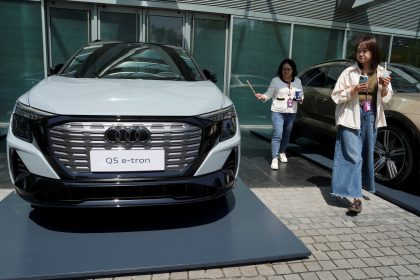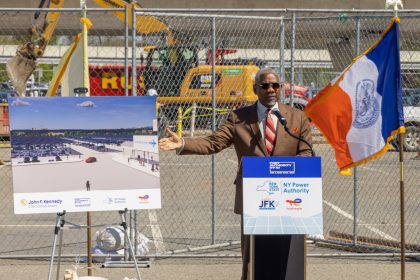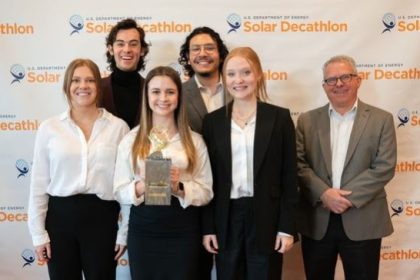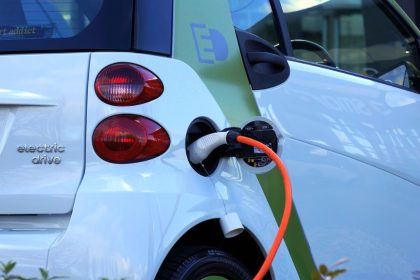Energy Department Allocating $3.1B to Support Battery Supply Chain

WASHINGTON — The U.S. Department of Energy is making $3.1 billion in funding from the bipartisan infrastructure law available to manufacturers and other commercial entities involved in making, retrofitting and recycling lithium-ion batteries.
The investment is part of the Biden administration’s effort to have more batteries and components made in the U.S. by bolstering domestic supply chains while creating good-paying jobs and lowering costs to consumers, department officials said.
The Energy Department is also making a separate $60 million available to support “second-life” applications for batteries once they’ve been used to power electric vehicles, as well as new processes to recycle materials back into the battery supply chain.
Both funding opportunities are key components of the administration’s whole-of-government supply chain strategy to strengthen America’s energy independence and support the president’s goal to have electric vehicles make up half of all vehicles sales in America by 2030, said Energy Secretary Jennifer Granholm in a written statement.
“Positioning the United States front and center in meeting the growing demand for advanced batteries is how we boost our competitiveness and electrify our transportation system,” she explained.
“President Biden’s historic investment in battery production and recycling will give our domestic supply chain the jolt it needs to become more secure and less reliant on other nations — strengthening our clean energy economy, creating good paying jobs, and decarbonizing the transportation sector,” she said.
According to a recent Energy Department report, National Blueprint for Lithium Batteries, 2021-2030, the global lithium-ion battery market is expected to grow rapidly over the next decade.
As of the end of March, more than 2.5 million plug-in electric vehicles have been sold in America, with more than 800,000 of those having been sold since Biden took office in January 2019.
The report notes that battery costs have fallen more than 90% since 2008, and energy density and performance have increased rapidly, these developments are helping to pave the way for an even faster transition to zero-emission vehicles.
But to seal the deal, Granholm and other officials say, responsible and sustainable domestic sourcing of the critical materials used to make lithium-ion batteries – such as lithium, cobalt, nickel, and graphite – is a must.
“Nevada’s innovation economy is at the forefront of battery manufacturing and recycling, and the infrastructure law could bring vital new investments to the state,” said Sen. Catherine Cortez Masto, D-Nev., who was among those who made sure funding for the sector was included in the infrastructure package.
“These grants to grow U.S. battery manufacturing are going to create good-paying jobs, spur our economic competitiveness, and help us combat the climate crisis,” she said.
Sen. Gary Peters, D-Mich., another supporter of the funding, said in a statement that he believes the funding announced Monday “could help to ensure Michigan remains on the forefront of innovation by shoring up our supply chains for advanced battery technologies.”
“The future of mobility is electric,” Peters said. “I was proud to help secure this funding through the Bipartisan Infrastructure Law to lessen our dependence on foreign producers like the Chinese government for these critical technologies — and help our automakers meet the growing demand for cleaner, safer cars.”
Of course, Democrats aren’t the only people on Capitol Hill pushing to accelerate production of battery materials that are needed to power electric vehicles.
Republicans Lisa Murkowski, R-Alaska, James Risch, R-Idaho, and Bill Cassidy, R-La., and Democrat Joe Manchin, D-W.Va. signed a bipartisan letter to Biden in March urging him to invoke the Defense Production Act to bolster America’s critical mineral supply chains.
“In order to address the threats to our national security, we respectfully request that you invoke the Defense Production Act to accelerate domestic production of lithium-ion battery materials, in particular graphite, manganese, cobalt, nickel, and lithium,” the letter said. “Our dependence on foreign-sourced cobalt and lithium is elevated as the processing of both is dominated by China.”
Between 2017 and 2020, China, a geopolitical competitor of the U.S. that recently introduced supply chain disrupting lockdowns in a bid to stamp out COVID-19 outbreaks, accounted for 78% of rare-earth compounds and metals imports to the U.S., according to the U.S. Geological Survey.
Dan can be reached at [email protected] and at https://twitter.com/DanMcCue.























